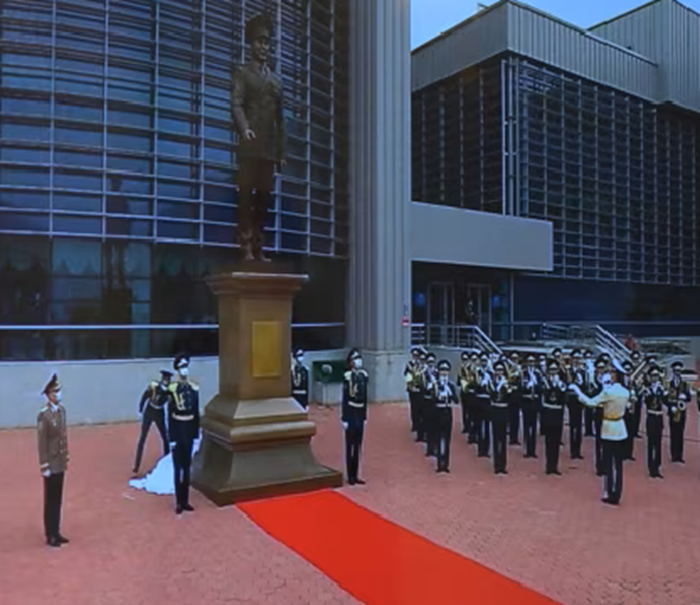The changing cult of Central Asian satraps
New accusations against relatives of former Kazakh President Nursultan Nazarbayev raise the issue of the cult of personality surrounding local leaders. Azattyk Asia's analysis: “The sudden transformation of the fathers of the nation into figures to be forgotten reflects the very meaning of political loyalty in our region.” The cases of Tajikistan and Turkmenistan.
Astana (AsiaNews) - The cult of personality surrounding Central Asian leaders is a legacy of the Soviet era, which has been called into question in various circumstances in the post-Soviet decades. New accusations against relatives of Kazakhstan's former president, Nursultan Nazarbayev, who turned 85 last July, raise different perspectives on this issue, which in the region represents a continuity dating back to medieval times and the Tatar-Mongol hordes.
Five years ago, it was unthinkable for the state newspaper Egemen Kazakstan to be published without a portrait of Nazarbayev on the front page, documenting his meetings, trips, and events in the presence of the “leader of the nation,” who was also always at the center of the main television channel Khabar. After the ‘Bloody January’ of 2022, Nazarbayev had to leave the scene, and his successor, Kassym-Jomart Tokayev, increasingly centralized power in his hands, restructuring the entire power vertical.
During Nazarbayev's 30 years in power, the state and the person of the president appeared to be inseparable, and even in the constitution he was called ‘the founder of independent Kazakhstan’ with the title of Elbasy, the ‘leader of the nation’, who, upon retiring from the presidency, had assigned himself the right to head the National Security Council for life. His portraits appeared everywhere, from government offices to banners on the streets, in schools, and even on the national currency, the tenge.
Since 2022, the de-Nazarbayevization, or rather the “de-Elbasyization,” of Kazakhstan has been underway, and last March, the speaker of the Mazhilis, Erlan Košanov, who owes his entire career to Nazarbayev, declared that ‘the super-presidential form of government has led the country into a serious political crisis’, with the excessive concentration of capital and power in a small group around a single personality, hindering the development of the entire country.
As early as 2023, Tokaev signed a series of laws depriving Nazarbayev of all his privileges, renaming the capital from Nur-Sultan to Astana, and removing the memory of the first president from the country's constitution. Last June, MP Kazybek Isa demanded that the title of Elbasy be removed from all official documents. As an anonymous Uzbek analyst commented in Azattyk Asia, “the sudden transformation of the founding fathers into figures to be forgotten reflects not only the peculiarities of the authoritarian regimes in our region, but also the very meaning of political loyalty in these countries, where the cult of personality is based on administrative resources, fear, and control of the public sphere.”
This is also the case for other Central Asian satraps, such as Tajikistan's President Emomali Rakhmon, who has been in power for 33 years and, according to the narrative of his daughter Ozoda, deputy director of the presidential administration, “turns stones into gold and spreads seeds of love throughout the country,” as stated in the poem she recited in honor of his recent 73rd birthday, the same age as Vladimir Putin and Alexander Lukashenko. The verses end with a request to God that “his shadow may forever stand out over our country.” Rakhmon also enjoys the title of Pešvon Millat, “founder of peace and national unity,” awarded to him by the Dushanbe parliament in 2016, and now hopes to avoid the same fate as Nazarbayev by transferring power to his son Rustam Emomali, mayor of the capital and deputy prime minister.
In Turkmenistan, the Berdymukhamedov dynasty has managed to replace and almost completely erase the memory of the first president, Saparmurat Niyazov, to whom a gold monument was even dedicated during his lifetime, and whose poem Rukhnam was declared a “sacred book” to be memorized in schools and universities. He too was remembered with the title Turkmenbaši, ‘Father of all Turkmen’, now replaced by Arkadag, ‘Father of the Fatherland’, assigned to his successor Gurbanguly Berdymukhamedov, the ‘president-father’ who left the seat to his son Serdar, awaiting the new dynastic successions in these latitudes.
07/02/2019 17:28







.png)










